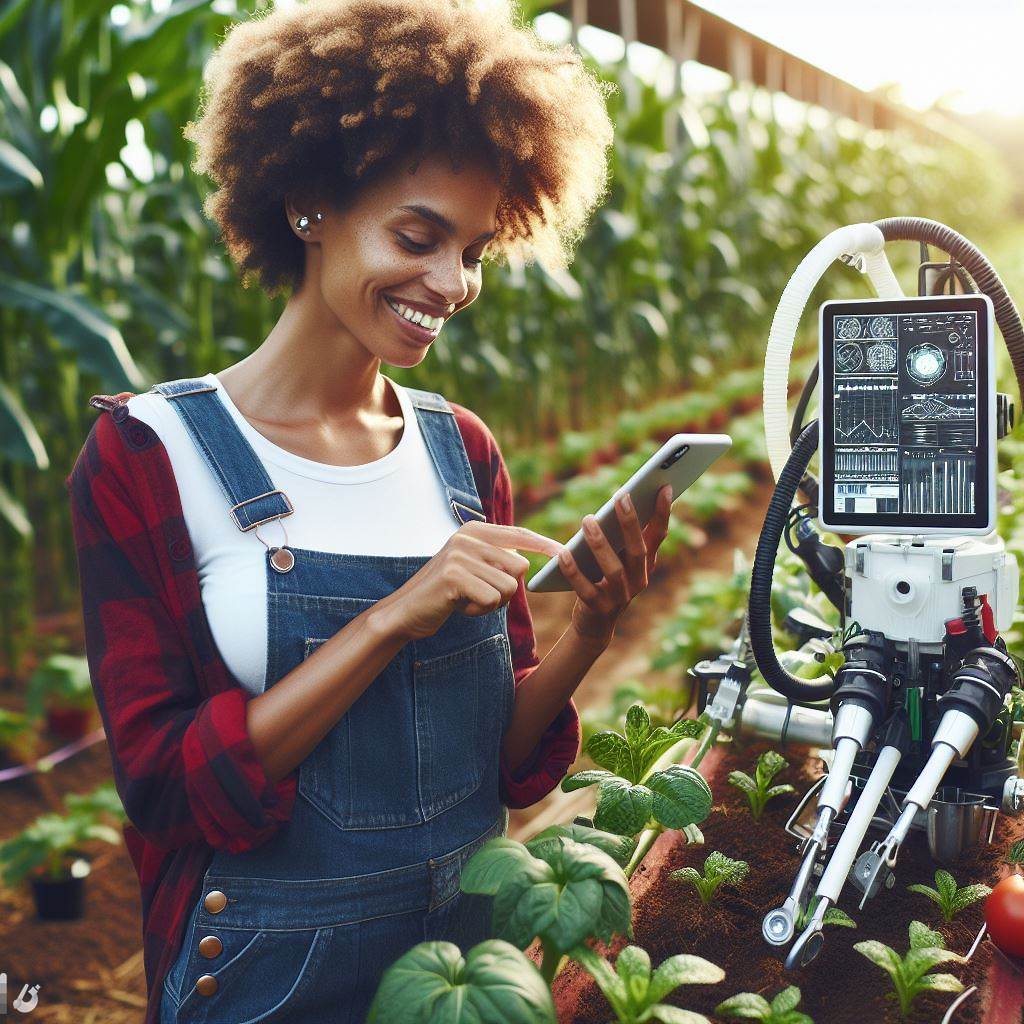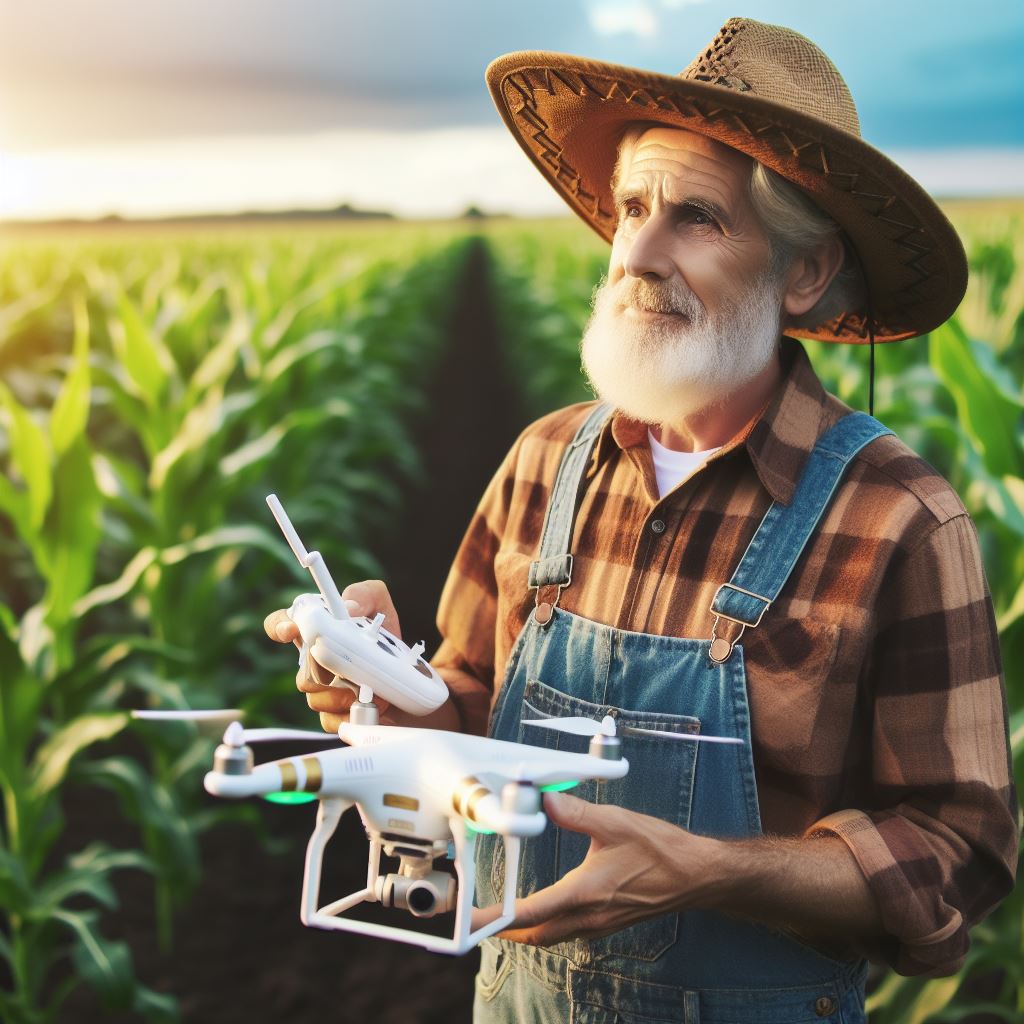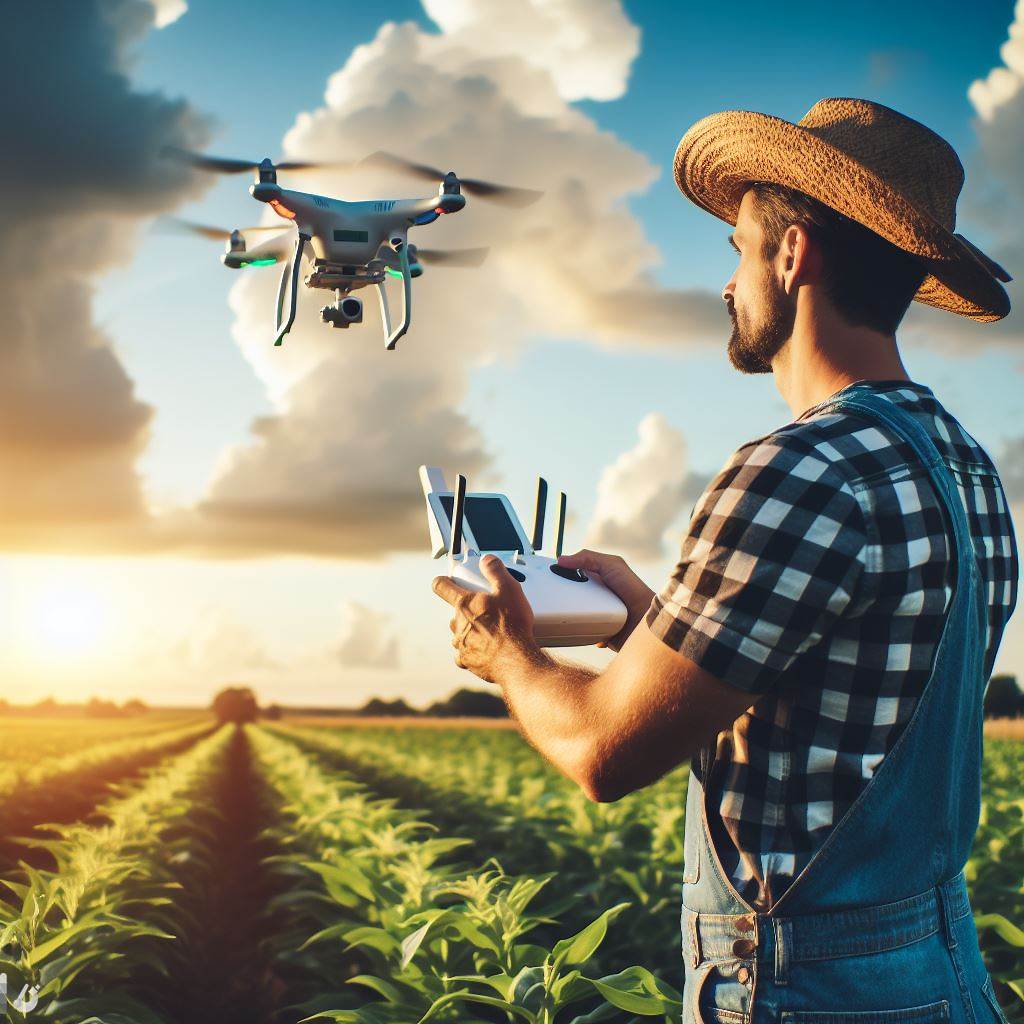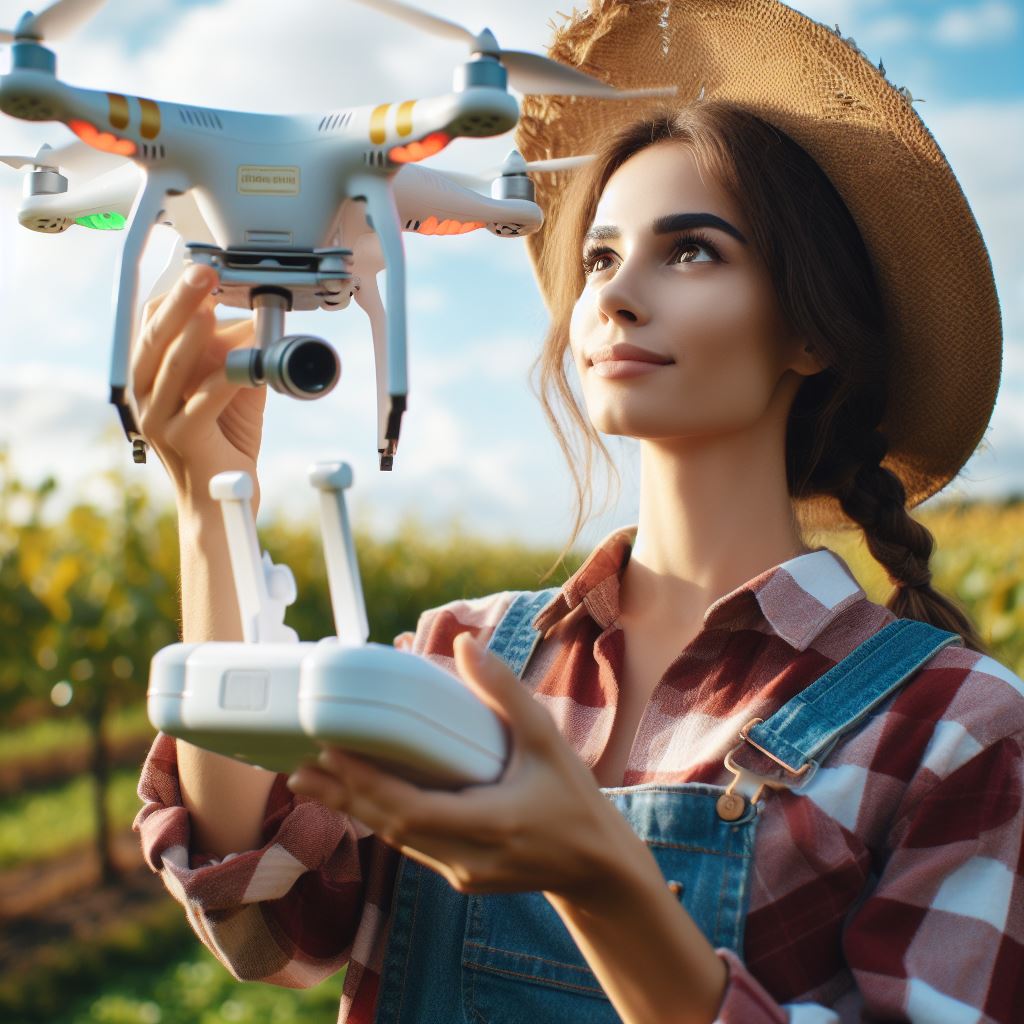Introduction
Organic farming is a method that avoids synthetic fertilizers and pesticides, focusing on natural methods to produce food.
Technology has revolutionized farming by enhancing efficiency, reducing waste, and improving productivity.
This blog post aims to discuss the potential technological advancements that can shape organic farming in 2024.
Technological Innovations in Organic Farming
- Precision Agriculture: Utilizing sensors, drones, and artificial intelligence for precise crop monitoring and targeted interventions.
- Vertical Farming: Vertical systems maximize land use by growing crops in stacked layers using LED lights and hydroponics.
- Robotic Farm Workers: Autonomous robots can assist in tasks like planting, weeding, harvesting, and even gathering real-time data.
- Internet of Things (IoT): Network-connected sensors and devices optimize water usage, monitor soil conditions, and automate irrigation systems.
Artificial Intelligence (AI) Applications
- Predictive Analytics: AI algorithms can analyze data from various sources to predict future pest outbreaks, diseases, or crop yields.
- Autonomous Vehicles: AI-powered driverless tractors enable efficient field operations, minimizing labor requirements.
- Crop Health Monitoring: AI-based image recognition can identify plant diseases, enabling early intervention and minimizing crop losses.
Advancements in Genetic Engineering
- Gene Editing: CRISPR technology allows precise genetic modifications in crops for disease resistance, increased yield, and better nutrition.
- Biopesticides: Developments in biological control agents provide eco-friendly alternatives to conventional chemical pesticides.
The future of organic farming relies on innovative technologies, such as precision agriculture, AI applications, and genetic engineering, to ensure sustainable and efficient food production.
Embracing these tech trends can help organic farming meet the challenges and demands of 2024 and beyond.
Current State of Organic Farming
Statistics on the growth of organic farming industry
- In the past decade, the organic farming industry has experienced significant growth.
- The global organic food market was valued at $97.6 billion in 2017.
- North America accounted for the largest market share of organic foods.
- Europe is the second-largest market for organic farming, with Germany being the leader.
- Asia-Pacific is witnessing rapid growth in organic farming, driven by consumer demand for healthy and sustainable food.
- The organic sector has become an important part of the agricultural economy in many countries.
- Organic farming not only focuses on producing safe and nutritious food but also aims to protect the environment.
- Consumer awareness about the benefits of organic products and the desire for pesticide-free foods are driving the demand for organic farming.
Challenges faced by organic farmers
- One of the biggest challenges faced by organic farmers is the need to maintain soil fertility.
- Controlling pests, diseases, and weeds without using synthetic chemicals is a constant struggle.
- Organic farming requires more labor compared to conventional farming methods.
- Organic farmers often face difficulties in finding suitable markets and distribution channels for their produce.
- Certification requirements and compliance with organic standards can be time-consuming and costly.
- Climate change presents additional challenges for organic farmers, as extreme weather events can impact yields.
- Transitioning from conventional to organic farming practices can be a lengthy and complex process.
Need for technological solutions to improve organic farming practices
- Technological advancements have the potential to address many challenges faced by organic farmers.
- Smart farming techniques can help monitor soil health and optimize inputs for organic crop production.
- Precision agriculture tools, such as remote sensing, can aid in early pest detection and control.
- Robotics and automation can help reduce labor requirements and improve efficiency in organic farming.
- Developing innovative organic fertilizers and biopesticides can enhance soil fertility and pest management.
- Data analytics and artificial intelligence can provide valuable insights for organic farming decision-making.
- Blockchain technology can enhance traceability and transparency in organic supply chains.
- Investment in research and development of organic farming technologies is crucial for the industry’s growth.
In short, the organic farming industry has witnessed significant growth, but organic farmers still face numerous challenges.
Technological solutions have the potential to improve organic farming practices and address these challenges.
Continued investment in research and development is essential for the future of organic farming in 2024.
Read: Data Analytics in Modern Farming
Emerging Technologies in Organic Farming
Organic farming has gained significant momentum in recent years, driven by increasing consumer demand for healthier and more sustainable food options.
To meet this growing demand, farmers are turning to technology to enhance their efficiency and productivity.
In the coming years, several emerging technologies are poised to revolutionize the organic farming industry.
Internet of Things (IoT) applications
The Internet of Things (IoT) enables the interconnection and exchange of data between devices and systems.
In organic farming, IoT applications have the potential to transform various aspects of the farming process.
- Soil monitoring and fertility management: IoT sensors can be embedded in the soil to continuously monitor essential parameters such as moisture levels, temperature, and nutrient content. This real-time data allows farmers to optimize their fertilization strategies and prevent nutrient imbalances.
- Weather monitoring and predictive analytics: IoT-based weather stations collect data on temperature, humidity, rainfall, and wind patterns. Advanced analytics algorithms can then provide farmers with accurate weather forecasts, helping them make informed decisions regarding irrigation, pest control, and harvesting.
Robotics and automation
Robots and automation systems are increasingly being deployed in organic farming operations, reducing labor-intensive tasks and improving efficiency.
Transform Your Agribusiness
Unlock your farm's potential with expert advice tailored to your needs. Get actionable steps that drive real results.
Get Started- Automated weed control mechanisms: Robots equipped with computer vision technology can distinguish between crops and weeds, enabling precise targeting and elimination of weeds. This minimizes the use of herbicides and reduces the environmental impact.
- Robotic harvesting systems: Harvesting crops is a time-consuming and labor-intensive process. Robotic systems can automate this task, improving efficiency and reducing harvest losses. These robots can carefully pick ripe fruits or vegetables, minimizing damage and improving crop quality.
Drones and aerial imaging
Drones equipped with advanced imaging technology are revolutionizing the way farmers monitor and manage their crops.
- Crop health assessment: Drones equipped with multispectral or hyperspectral sensors can capture high-resolution images of crops. By analyzing these images, farmers can identify stressed areas, nutrient deficiencies, or diseases at an early stage. This enables targeted interventions, such as precise application of fertilizers or pesticides.
- Pest and disease detection and control: Aerial imaging allows farmers to detect pests or diseases in their early stages. This early detection enables prompt action, preventing the spread of diseases and minimizing crop losses. Drones can also be used to release beneficial insects for natural pest control, reducing the reliance on pesticides.
Generally, emerging technologies such as IoT applications, robotics, and drones are set to revolutionize the organic farming industry.
These technologies offer farmers the opportunity to improve productivity, optimize resource management, and reduce environmental impact.
By embracing these innovations, organic farmers can meet the increasing demand for sustainable and healthy food while ensuring profitability and long-term sustainability.
Read: Water Tech in Controlled Ag Environments
Potential Technological Advancements for 2024
Artificial Intelligence (AI) integration
Predictive analytics for optimized agriculture
In 2024, artificial intelligence (AI) will revolutionize organic farming by using predictive analytics to optimize agriculture.
AI algorithms will analyze various data points such as weather patterns, soil quality, and crop characteristics to provide accurate predictions.
Farmers will be able to make informed decisions about irrigation, fertilization, and pest control, resulting in higher yields and environmentally sustainable practices.
AI-enabled decision-making in organic farming
AI will play a crucial role in decision-making for organic farming in 2024. By using machine learning algorithms,
AI systems will analyze complex relationships between different variables and provide real-time recommendations.
Farmers will have access to data-driven insights on planting schedules, crop rotation, and pest management.
AI will empower farmers with valuable knowledge, increasing productivity and reducing risks.
Genetic engineering and biotechnology
Improving disease resistance in organic crops
Genetic engineering and biotechnology advancements in 2024 will focus on enhancing disease resistance in organic crops.
Scientists will develop genetically modified organisms (GMOs) that can combat common crop diseases.
By introducing specific genes that boost immunity, organic farmers will be able to minimize the use of pesticides and protect their crops more effectively.
This approach will lead to healthier and more sustainable organic farming practices.
Enhancing crop productivity through genetic modifications
In 2024, genetic modifications will be used to enhance crop productivity in organic farming.
Scientists will identify and modify genes responsible for traits such as drought tolerance, nutrient absorption, and growth rate.
By introducing these genetic modifications into organic crops, farmers will be able to increase yields while maintaining the integrity of organic farming practices.
This technological advancement will contribute to global food security and support sustainable agriculture.
Essentially, the year 2024 holds great potential for technological advancements in organic farming.
Artificial intelligence integration will enable predictive analytics and AI-enabled decision-making, empowering farmers with data-driven insights and optimizing agriculture practices.
Genetic engineering and biotechnology will focus on improving disease resistance and enhancing crop productivity, contributing to sustainable organic farming.
These advancements will revolutionize the organic farming industry, ensuring higher yields, reduced environmental impact, and a more sustainable future for agriculture.
Showcase Your Farming Business
Publish your professional farming services profile on our blog for a one-time fee of $200 and reach a dedicated audience of farmers and agribusiness owners.
Publish Your ProfileRead: Hydroponic Systems: Tech Advances

Benefits and Impacts of Tech Advancements in Organic Farming
Increased efficiency and productivity
- Tech advancements will automate various farming processes, saving time and effort for farmers.
- The use of drones and satellite imagery will help in monitoring crop growth and identifying areas of improvement.
- Precision agriculture techniques, like soil sensors and smart irrigation systems, will ensure optimal resource utilization.
- Farmers can use mobile apps and online platforms to access real-time data and manage farm operations efficiently.
- With the help of robotic systems, tasks like planting, weeding, and harvesting can be done with precision and speed.
- The implementation of AI systems will enable predictive analysis and improve decision-making on the farm.
Reduced environmental impact
- Tech innovations will reduce the need for synthetic fertilizers and pesticides, minimizing their environmental footprint.
- Smart monitoring systems will prevent over-irrigation, reducing water wastage and promoting sustainable water management.
- Implementation of renewable energy sources, such as solar panels, will decrease reliance on non-renewable energy.
- Farmers can adopt circular economy practices, like composting and organic waste management, to minimize pollution.
- Advanced analytics will facilitate better monitoring of soil health, leading to improved soil conservation practices.
Improved food quality and safety
- Technological advancements will improve traceability, enabling consumers to track the origin of their organic produce.
- Controlled environment agriculture methods will ensure year-round availability of fresh and nutritious organic produce.
- Sensors and data analytics will help identify potential contamination risks, ensuring safer organic food production.
- Smart packaging solutions will prolong shelf-life and maintain the nutritional value of organic products.
- With increased automation, the risk of human errors in food processing and packaging will be reduced.
Economic implications for organic farmers
- Tech advancements will enhance crop yields, leading to increased revenue for organic farmers.
- Access to real-time market data will enable organic farmers to make informed decisions about pricing and production.
- Efficient farm management through technology will save costs associated with labor, inputs, and resource wastage.
- Adoption of advanced machinery will reduce physical labor, attracting more individuals to the organic farming sector.
- Tech-enabled direct-to-consumer platforms will provide organic farmers with better market opportunities and higher profits.
In general, the implementation of technology in organic farming in 2024 will bring numerous benefits and positive impacts.
Increased efficiency and productivity, reduced environmental impact, improved food quality and safety, and economic implications for organic farmers are some of the key advantages.
Embracing these advancements will not only sustain the growth of the organic farming industry but also contribute to a healthier and more sustainable food system.
Read: Urban Farming: Tech and Techniques
Challenges and Ethical Considerations
Potential impact on biodiversity
- The adoption of tech in organic farming may disrupt natural ecosystems and threaten biodiversity.
- Increased use of machinery and synthetic inputs may disturb the delicate balance of ecosystems.
- It is crucial to carefully assess the potential consequences on wildlife and plant species in the long term.
- Strategies should be developed to minimize any negative impacts on the surrounding environment.
- Technological advancements must prioritize sustainability and protection of biodiversity.
Ensuring equitable access to technology for all farmers
- The digital divide could prevent small-scale and marginalized farmers from accessing necessary technologies.
- Efforts must be made to bridge the gap and provide equal opportunities for all farmers.
- Access to technology could enhance productivity, reducing inequality in the farming sector.
- Investments in training and support programs can enable farmers to effectively utilize advanced tools and techniques.
- Collaborations between governments, NGOs, and private sector entities are essential in achieving equitable access.
Maintaining the integrity of organic farming principles
- The introduction of technology should not compromise the fundamental principles of organic farming.
- Adopted technologies must align with organic farming’s commitment to sustainability and environmental stewardship.
- Strategies should focus on minimizing synthetic inputs and promoting natural pest and weed control methods.
- Rigorous certification processes should be in place to ensure technology adherence to organic standards.
- Ongoing monitoring and evaluation are necessary to maintain transparency and consumer trust in organic products.
The integration of technology into organic farming practices brings forth several challenges and ethical considerations that need to be addressed.
These challenges primarily revolve around potential impacts on biodiversity, equitable access to technology, and maintaining the integrity of organic farming principles.
Potential impact on biodiversity
One concern is the potential disruption of natural ecosystems and biodiversity.
The widespread adoption of technology in organic farming may inadvertently harm wildlife and plant species. Increased use of machinery and synthetic inputs can disturb the delicate balance of ecosystems.
Therefore, it is crucial to carefully assess the consequences of these advancements in the long term.
Strategies should be developed to minimize negative impacts on the surrounding environment, ensuring the protection and sustainability of biodiversity.
Ensuring equitable access to technology for all farmers
Another significant challenge is ensuring equitable access to technology for all farmers.
The digital divide, particularly prevalent in rural and marginalized areas, could impede small-scale farmers from accessing necessary technologies.
Bridging this gap is essential to provide equal opportunities for all farmers.
Access to technology has the potential to enhance productivity and reduce inequality in the farming sector.
Investments in training and support programs can empower farmers to effectively utilize advanced tools and techniques.
Collaborations between governments, NGOs, and private sector entities are crucial in achieving equitable access to technological solutions in organic farming.
Maintaining the integrity of organic farming principles
Maintaining the integrity of organic farming principles is also of utmost importance.
The introduction of technology should not compromise the fundamental values and practices of organic farming.
New technologies must align with the industry’s commitment to sustainability, environmental stewardship, and natural farming methods.
Strategies should focus on minimizing the use of synthetic inputs and promoting natural pest and weed control measures.
Rigorous certification processes should be in place to ensure adherence to organic standards.
Ongoing monitoring and evaluation are necessary to maintain transparency and consumer trust in organic products.
In essence, while the integration of technology in organic farming presents numerous benefits, it also poses challenges and ethical considerations.
These include potential impacts on biodiversity, ensuring equitable access to technology, and maintaining the integrity of organic farming principles.
Addressing these challenges requires a comprehensive approach involving careful assessment, collaboration, and adherence to sustainable practices.
By navigating these obstacles successfully, the organic farming industry can harness the full potential of technology to enhance productivity while staying true to its core values.
Uncover the Details: Agri Robots: The Pros and Cons
Conclusion
Recap of the importance of technology in organic farming
In this blog post, we have discussed the significance of technology in organic farming.
We explored how innovative technologies can contribute to sustainable and efficient agricultural practices.
Future prospects and possibilities for tech-enabled organic farming
Looking ahead to 2024, there are promising prospects for tech-enabled organic farming.
Advancements in precision agriculture, AI, and IoT can revolutionize farming methods, leading to increased productivity and reduced environmental impact.
Call to action for farmers to embrace and adapt to new technologies
To stay ahead in the ever-changing agricultural landscape, farmers must be willing to embrace and adapt to new technologies.
By incorporating smart farming tools and systems, farmers can enhance their yields, optimize resource usage, and contribute to a greener and more sustainable future.
It is crucial for farmers to actively seek out and implement tech solutions, attending workshops, and networking with industry experts.
In a nutshell, technology has proven to be an invaluable tool for organic farming, providing solutions to the challenges faced by farmers.
By embracing technology, organic farmers can achieve improved efficiency, profitability, and environmental stewardship.
Let us work hand in hand to harness the power of technology and take organic farming to new heights in the years to come.




